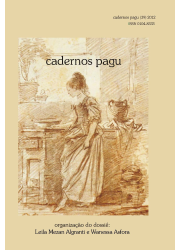Resumo
Neste artigo analiso as representações sobre as mulheres migradas nos fundos audiovisuais de algumas entidades que trabalham com gênero e imigração em Barcelona. Por haver detectado nos audiovisuais analisados uma associação recorrente das mulheres migradas à pobreza, à criminalidade, à ignorância, à maternidade obrigatória e numerosa, à prostituição etc., busquei entender como tais representações tomam forma, estudando os elementos narrativos, estilísticos, visuais e verbais através dos quais se articulam essas imagens e discursos sobre as mulheres migradas.
Abstract
In this paper I analyze the representations of the migrant women at the audiovisual founds in some of the organizations that work with gender and immigration in Barcelona. At the audiovisuals I have found a recurring association of the migrant women with poverty, criminality, ignorance, passivity, undocumentation, gender violence, compulsory and numerous motherhood, prostitution, etc. Thus, I tried to understand the ways in which these representations are shaped, studying the narrative, stylistic, visual and verbal elements through which these images and discourses of the migrant women are articulated.
Key Words: Gender, International Migrations, Audiovisuals
Referências
ARGOTE, Rosabel. La mujer inmigrante en el cine español del inaugurado siglo XXI. Feminismo/s (2), Alicante, Editora da Universidade de Alicante, 2003, pp.121-138.
BUTLER, Judith. Gender Trouble: Feminism and the subversion of identity. New York, Routledge, 1990.
FONDO DE POBLACIÓN DE LAS NACIONES UNIDAS. (ed.) State of World Population 2006. A Passage to hope: women and international migration. New York, NFPA, 2006.
GREGORIO, Carmen. Procesos migratorios y desigualdad de género. In: GARCÍA-MINA, Ana e CARRASCO, Maria José. (eds.) Cuestiones de género en el fenómeno de las migraciones. Madrid, Universidad Pontificia Comillas, 2002, pp.11-38.
HARAWAY, Donna. Simians, cyborgs, and women – the reinvention of nature. New York, Routledge, 1991.
KING, Russel e WOOD, Nancy. (Eds.). Media and Migration: Constructions of mobility and difference. London, Routledge, 2001.
LARIO, Manuel et alii. Medios de comunicación e inmigración. Murcia, Caja de Ahorros del Mediterráneo, 2006.
LORITE, Nicolas. (dir.) Tratamiento informativo de la inmigración en España, 2002. Madrid, Ministerio de Trabajo y Asuntos Sociales, IMSERSO, 2004.
NICHOLS, Bill. Representing Reality: Issues and Concepts in Documentary. Bloomington, Indiana University Press, 1991.
PARELLA, Sonia. Mujer, inmigrante y trabajadora: la triple discriminación.
Rubí (Barcelona), Anthropos Editorial, 2003.
PÉREZ, Lola. Obstáculos y oportunidades para mejorar la cobertura de la inmigración en femenino en los medios. Mujeres en Red. El periódico feminista (32), 2008. Disponível em: <http://www.mujeresenred.net/spip.php?article1058> - acesso em: 05 de abril de 2008.
RODRIGO, Miguel e MEDINA, Pilar. Posmodernidad y Crisis de Identidad.
Revista Científica de Información y Comunicación (3), Sevilla, 2006, pp.126-146.
ROSENSTONE, Robert. El pasado en imágenes. El desafío del cine a nuestra idea de la historia. Barcelona, Editorial Arial, 1997.
SANTAOLALLA, Isabel. Los “otros”: etnicidad y “raza” en el cine español contemporáneo. Zaragoza, Prensas Universitarias de Zaragoza, 2005.
SIPI, Remei; ARAYA, Mariel. Les Dones Migrades: apunts, històries, reflexions, aportacions… Barcelona, Institut Català de les Dones, 2005.
STOLKE, Verena. Talking Culture: New Boundaries, New Rhetorics of Exclusion in Europe. Current Anthropology, Chicago, vol. 36, nº 1, 1995, pp.1-24.
WEINRICHTER, Antonio. Desvíos de lo real. El cine de no ficción. Madrid, T&B editores, 2004.

